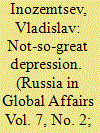|
|
|
Sort Order |
|
|
|
Items / Page
|
|
|
|
|
|
|
| Srl | Item |
| 1 |
ID:
109159


|
|
|
|
|
| Publication |
2011.
|
| Summary/Abstract |
It's a commonplace that Federal Reserve chairman Ben Bernanke draws his policies from Milton Friedman and Anna Schwartz's A Monetary History of the United States (MH). With that in mind, this article establishes five points. First, contrary to conventional wisdom, Friedman and Schwartz merely insinuate their claim the Fed caused the Depression in MH. Second, their criticisms of Fed policy during the Depression, which turn on its refusal to adopt open market purchases (OMPs), repudiate Friedman's famed libertarianism and market fundamentalism. Third, Friedman and Schwartz don't refute the practical objections of bankers who opposed OMPs in the 1930s. Consequently, Bernanke's policies for addressing the financial crisis risk doing precisely what Friedman's targets warned against-encouraging financial speculation without addressing problems of unemployment. Fourth, Friedman and Schwartz's prescriptions entail a neoliberal, not a libertarian, state, one governed by technocrats and answerable to financial markets. Finally, what accounts for and unifies Friedman's contradictions is the beneficiary-finance.
|
|
|
|
|
|
|
|
|
|
|
|
|
|
|
|
| 2 |
ID:
088836


|
|
|
| 3 |
ID:
161886


|
|
|
|
|
| Summary/Abstract |
China's fast economic growth in the past decades is accompanied by a rapid epidemiological transition from communicable to non-communicable diseases (NCDs). An important yet often neglected NCD is mental disorder, which accounts for 14% of global disease burden but has been paid relatively little research attention in China. This paper uses a nationally representative dataset to investigate the prevalence and correlates of depression and depressive symptoms among the adult population in China. Our results indicate that the prevalence rate of depression, estimated with the Center for Epidemiologic Studies Depression Scale (CES-D), is high (37.9% for depressive symptoms and 4.1% for depression) and unevenly distributed across regions and subpopulations. Specifically, women, older people and those who live in the central/western and rural areas are more likely to be depressed. We also find significant socioeconomic gradients in mental health: higher education and income levels are associated with lower likelihood of depression, especially among the lower socioeconomic groups. Our results indicate the urgent need for depression prevention and treatment in China (particularly in the economically less developed regions) through the expansion of primary mental health care resources and a reduction of socioeconomic inequalities.
|
|
|
|
|
|
|
|
|
|
|
|
|
|
|
|
| 4 |
ID:
000549


|
|
|
|
|
| Publication |
London, Penguin, 1999.
|
| Description |
xx,176p.
|
| Standard Number |
0713493898
|
|
|
|
|
|
|
|
|
|
|
|
Copies: C:1/I:0,R:0,Q:0
Circulation
| Accession# | Call# | Current Location | Status | Policy | Location |
| 041920 | 338.542/KRU 041920 | Main | On Shelf | General | |
|
|
|
|
| 5 |
ID:
181413


|
|
|
|
|
| Summary/Abstract |
This article discusses social and legal problems of the mental health of the population of Russia and China using the example of depressive disorders spectrum. The urgency of the problem is due to the wide diffusion of the disease, the difficulty of early diagnosis, and the growing risk of suicide; it is of great importance in most countries. A comparative analysis of legal problems in the two countries in the field of mental health prevention, conducted at macrosocial levels through parallel sociological and psychological studies in Khabarovsk Territory (Russia) and Heilongjiang Province (China), shows a significant difference in the state approaches of the adjacent countries of the Far East. In Heilongjiang Province, the adolescent depression prevention model has been implemented and is highly effective.
|
|
|
|
|
|
|
|
|
|
|
|
|
|
|
|
| 6 |
ID:
105331


|
|
|
| 7 |
ID:
177524


|
|
|
|
|
| Summary/Abstract |
IN EARLY JUNE 2020, The National Bureau of Economic Research (New York), which is responsible for monitoring developmental cycles in the American economy, made the announcement that February 2020 had marked a peak in the American economy's latest climb, which began in June 2009 and continued for more than 10.5 years (128 months). This stretch of the American economy's growth has been the longest since such cycles started being observed and studied in 1854 [1]. Then, beginning in March 2020, primarily as a result of the coronavirus epidemic, the U.S. economy began a precipitous slide into economic crisis. And the first outcomes of the American economy's slide to the bottom immediately brought to mind the Great Depression of 1929-1939, because such indicators have not been marked since the end of World War II in the mid-1940s.
|
|
|
|
|
|
|
|
|
|
|
|
|
|
|
|
|
|
|
|
|